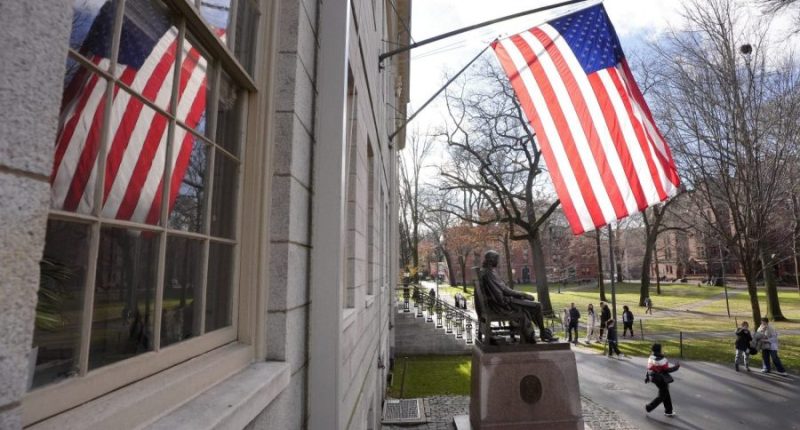Share this @internewscast.com

The Trump administration’s efforts to block international students from Harvard could come at a hefty price and not just for the university.
Harvard students are top innovators in the country, with foreign-born alumni leading dozens of successful startups.
Besides their business contributions, international students more broadly make up a sizeable portion of spending in their areas, throwing almost $44 billion into the U.S. economy.
“We turn global talent away at our own expense. Losing international students’ contributions will negatively impact domestic students’ understanding of the world and have dire consequences for the country’s economic strength, security, and global competitiveness,” said Fanta Aw, executive director and CEO of the Association of International Educators, or NAFSA, in a statement.
“These outcomes run counter to the administration’s stated goal of making America safer, stronger, and more prosperous,” Aw added.
Along with saying new international talent cannot come to Harvard, the Department of Homeland Security (DHS) this week demanded that current foreign students leave the school for other colleges.
A judge on Friday temporarily blocked the move and scheduled a hearing for Thursday to consider a longer pause. District Judge Allison Burroughs noted Harvard’s concern “it will sustain immediate and irreparable injury before there is an opportunity to hear from all parties.”
If a later ruling allows the ban to move forward, Harvard would feel the pinch immediately: 27 percent of its student body, or some 6,800 attendees, in the 2024-2025 academic year was made up of international students, who typically pay more in tuition and other costs than domestic ones.
According to NAFSA data, international students at Harvard contribute approximately $383.6 million annually to the area economy, supporting around 3,910 jobs.
In the 2023-2024 academic year, Harvard’s international students made up 54.5 percent of the total spending by foreign students studying in Massachusetts’s 5th Congressional District.
The state sees almost $4 billion a year in foreign students’ spending, with Harvard making up around 10 percent of that.
International scholars spend money on tuition and books, but also on accommodations, dining, retail, health insurance, telecommunication and transportation, NAFSA notes.
Around two-dozen billion-dollar U.S. startups were founded by foreign students who studied at Harvard, according to an analysis from Axios.
And the effects could soon ripple out. Homeland Security Secretary Kristi Noem made clear in her announcement of the Harvard ban that other colleges that displease the Trump administration could follow suit, calling it “a warning to every other university to get your act together.”
For every three international students, one job was created in the U.S., according to NAFSA. In total, foreign students supported or created almost 380,000 jobs.
The situation for international students in the U.S. was already perilous, with hundreds seeing their visas pulled, sometimes with little explanation. In many high profile cases, the government has gone after students who were involved in the pro-Palestinian movement on their campuses.
Harvard’s lawsuit against DHS’s move is the second it has filed against the Trump administration; the first last month came after the government froze billions of dollars in federal funding when the university refused to bow to its demands to change its hiring and admissions policies, as well as eliminate diversity, equity and inclusion on campus.
President Trump has also called for the IRS to revoke Harvard’s tax-exempt status.
The administration accuses Harvard and other schools of failing to protect their students from antisemitism, often specifically regarding last year’s protests amid the war in Gaza.
Even if Harvard does have to replace all its international scholars, it would struggle to do so before the fall semester.
“Harvard can replace all those international students with Americans, pretty easily, but it’s hard to do that on short notice,” said Robert Kelchen, a professor and head of the Department of Educational Leadership and Policy Studies at the University of Tennessee.
“I think that other colleges would normally be happy to take students to help them out during a time of need. I think the question is, will the administration issue a threat that if any of these students end up transferring to put that institution’s funding at risk?” Kelchen added, warning Trump could also to go after the school’s ability to receive federal student aid.
“At this point, the only lever that the federal government has not used against Harvard is financial aid for students. And I think that’s quite possible at this point, because basically every other funding source has been cut off,” he said.










